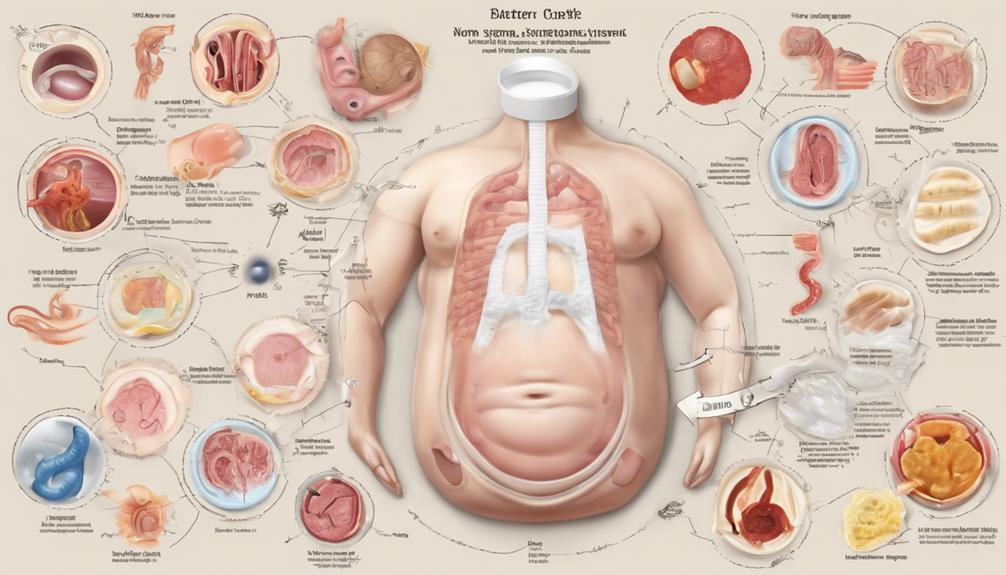As we delve into the world of neonatal nursing, we navigate the intricate paths of infancy, surrounded by the delicate needs of our society’s tiniest members.
The role of a newborn care nurse is akin to that of a gentle shepherd guiding a flock, ensuring each lamb receives the attention and care it requires to thrive.
But what lies beneath this nurturing facade? What tales of midnight feedings and soothing lullabies await our discovery in this uncharted territory of infancy? Join us as we unravel the mysteries of what truly defines the essence of a newborn care nurse's duties.
Key Takeaways
- Provide expert newborn care including feeding, diapering, and soothing.
- Educate parents on infant development and milestones.
- Assist in creating schedules for feeding, sleeping, and diaper changes.
- Tailor care to meet the unique needs of each family.
Responsibilities and Duties
As newborn care nurses, we provide essential expert care for newborns, encompassing feeding, diapering, and soothing. Throughout the night, we're there to support parents in caring for their baby, offering guidance on feeding techniques, diaper changes, and soothing methods. Our role extends beyond just the physical care of the newborn; we also educate parents on infant development, helping them understand the various milestones and behaviors they can expect from their little one.
In addition to hands-on care, we assist parents in creating schedules to track feeding, sleeping, and diapering patterns, ensuring the baby's needs are consistently met. We work closely with hiring parents to tailor our approach to the unique needs of each family, providing personalized care and support. While we don't handle unrelated household tasks, our sole focus on newborn care allows us to offer valuable support and guidance to families during this special time.
Essential Skills and Qualifications

Specialized training in newborn care, breastfeeding support, and infant health assessments is essential for newborn care nurses. To excel in this role, newborn care specialists must possess a unique set of skills and qualifications:
- Communication Skills: Effective interaction with parents is paramount, as newborn care nurses play a vital role in educating families on newborn care practices.
- Safe Sleep Practices: Knowledge of safe sleep guidelines is crucial to guarantee the well-being of infants during sleep times.
- Developmental Milestones: Understanding typical developmental milestones helps nurses monitor and support healthy growth and development in newborns.
- Certifications: Many newborn care nurses hold certifications such as Certified Newborn Care Specialist (CNCS) to demonstrate their expertise in providing comprehensive care.
- Infant Health Assessments: The ability to recognize signs of potential health issues and perform thorough health assessments is essential for providing high-quality care to newborns.
Having these skills and qualifications equips newborn care nurses to deliver the best care and support to both infants and their families.
Typical Daily Tasks
Understanding the importance of a newborn care nurse's role, we now shift our focus to the typical daily tasks they undertake to guarantee the well-being of both infants and their families.
As registered nurses specializing in newborn care, our job duties revolve around providing essential support to new parents. We work closely with families, especially during night shifts, assisting with baby care such as feeding, changing diapers, and soothing the little ones to make sure they're comfortable and content.
Educating and empowering new parents is a significant aspect of our role, as we guide them on best practices for newborn care, including maintaining healthy sleep patterns and establishing routines. Additionally, we meticulously monitor the baby's health and development, keeping detailed logs of feedings, diaper changes, and sleep patterns.
Benefits for Newborns and Parents

Newborn care nurses provide invaluable support and guidance to both newborns and parents, ensuring a smooth change into the early weeks of parenthood. Hiring a baby nurse can greatly benefit families in various ways:
- Expert Care: Baby nurses can help parents with the new and sometimes overwhelming tasks of caring for a newborn, such as feeding and soothing techniques.
- Rest for Parents: One of the primary roles of a newborn care specialist is to take care of the baby during the night, allowing parents to rest and recharge.
- Establishing Routines: By working closely with families, newborn care nurses assist in establishing healthy sleep and feeding routines for the newborn.
- Peace of Mind: Parents can rest assured knowing that their baby is in capable hands, which provides peace of mind during this critical time.
- Empowerment: Through their guidance and support, these specialists empower parents with the knowledge and skills needed to confidently care for their newborns.
How to Become a Newborn Care Nurse
Becoming a newborn care nurse typically requires obtaining a high school diploma or equivalent and completing a certified newborn care specialist training program. To become a nurse specialized in newborn care, one must use the knowledge gained from training programs that cover various topics like newborn development, feeding techniques, sleep training, and postpartum care. Additionally, it's important to make sure to pursue additional certifications in areas like infant CPR, first aid, lactation consulting, or sleep coaching to enhance skills further.
Hands-on experience through internships or working under experienced professionals is essential. Newborn care nurses play a significant role in helping parents recover from birth by providing the necessary support and guidance. They're often hired to bring the baby home, especially when parents need a night of rest.
Continuous learning is key for nurses to stay updated on the best practices in newborn care, ensuring they provide high-quality care to infants and valuable support to families.
Frequently Asked Questions
What Is the Role of a Nurse in Newborn Care?
In newborn care, we nurture, educate, and support families. Our role involves guiding parents, tracking care routines, and prioritizing newborn well-being. We focus solely on newborn care, promoting health and safety for infants.
What Does a Newborn Nurse Do?
We support families by providing expert care for newborns, guiding parents through feeding, diapering, and monitoring their health. Our role extends beyond basic tasks; we offer advice on routines, feeding schedules, and infant growth, ensuring a smooth shift into parenthood.
What Is Basic Newborn Care Nursing?
In basic newborn care nursing, we prioritize feeding, diaper changing, soothing, monitoring health, and educating parents on infant care. Our role involves guiding families through essential skills like bathing, swaddling, and understanding developmental milestones.
What Is the Role of a Newborn Care Specialist?
Supporting families in adjusting to their newborn's needs, we offer expert care, guidance, and education on feeding, diapering, soothing, and developmental support. Our goal is to empower parents with confidence in caring for their new baby.
Conclusion
To summarize, newborn care nurses are like the guiding stars in the night sky for new parents, providing comfort, support, and expertise during the challenging early weeks of parenthood.
Their nurturing care not only benefits the newborns by ensuring they're well taken care of, but also eases the worries and anxieties of parents, helping them navigate the journey of parenthood with confidence and peace of mind.










